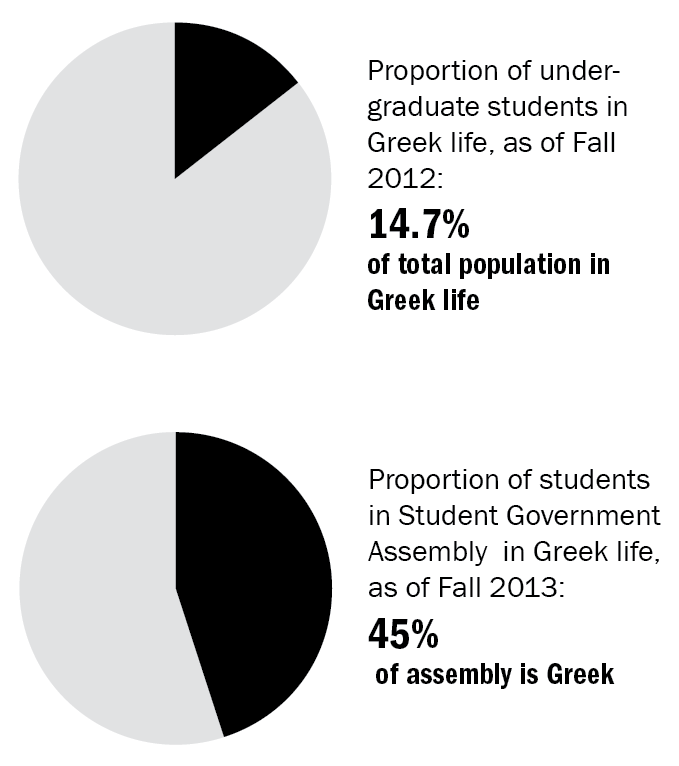This Tuesday, less than a month into the semester, students will be asked to vote in the first Student Government election of the school year when they elect two first-year representatives from the freshman class. In the buzz that surrounds both this election and the larger elections in the spring, I, myself a Greek member of the Student Government Assembly, find myself struggling with an issue that is often spoken of but rarely confronted: dominant Greek representation in Student Government.
More than half of the people who represent students and who make decisions regarding students’ academic, external and internal concerns come from 14 percent of UT’s general population. There are 16 students who are members of Greek organizations sitting on a 31-person legislative body, not to mention the student body president, who is also a member of a Greek organization and holds the power of appointment for more than 17 executive agencies.
This imbalance is not something that has gone unnoticed, nor is it something that I believe should go unaddressed. The University of Texas at Austin is devoted to creating a diverse and inclusive campus. However, within Student Government, we fall short of achieving that same demographic ideal.
It would appear that the Greek candidates almost always win their elections, presumably because Greeks have the privileged support of a large and active voter base. Unfortunately, while the support for Greek candidates is tremendous, even humbling, it creates an unnecessary barrier to entry for the remaining 86 percent of our campus, resulting in the lower level of representation of non-Greek students in the assembly. All this raises the question: How is Student Government as an organization supposed to address student issues if there isn’t a diverse range of students to contribute their perspectives and solutions? The answer is quite simple: It can’t. Not fully, anyway.
In addition to the obvious problems with having a majority Greek assembly, there are many misconceptions about Greek representatives caused by the advantages Greek students have in the election process. Below are three examples of complaints myself and other Student Government members have heard and the corresponding responses I would give, given my own experiences:
1) Greek assembly hopefuls don’t have to campaign because they automatically get the Greek vote.
The Truth: As a whole, we do run campaigns. We dedicate hours standing on the West Mall and have trash cans of flyers no one actually reads to prove it. We have YouTube videos, Twitter accounts, Facebook pages, damaged grades during election season, friends that are inundated with notifications about our platform points and a whole lot of organization meetings to attend in order to get our names out there.
2) Greek assembly members make sure their friends get positions within Student Government.
The Truth: All representative positions are elected, and there is no feasible way internal members could grant anyone those positions. Regarding appointments, the Executive Board (composed of the President, VP and five other members that essentially serve as their “cabinet”) extensively interview everyone who fills out the appointment applications and officially put people up for appointments. Once nominated for appointment, each appointee is carefully reviewed by the Assembly Board (a committee comprised of all committee chairs, typically representatives with experience or relevant platforms), and finally the Student Government Assembly (composed of college, First Year, and University Wide Representatives) questions, debates and votes on the appointees.
3) Greek members of the assembly are not dedicated and don’t make any real change.
The Truth: Absolutely untrue. There are, admittedly, representatives who are elected and drop the assembly for a variety of reasons, but there is no trend that suggests these are predominantly Greek members. Most of us have excellent attendance records, work regularly with administrators and students and often achieve our platform points by the end of the session.
In short, Greek students have had many positive impacts on our University through Student Government. But that doesn’t change my belief that the advantage possessed by Greek candidates in Student Government elections is unfair. Consequently, I encourage you to endorse the candidates who best represent your views, whatever background, culture, organization or political affiliation they themselves may hold. The Greek community is by no means the only area of campus capable of mobilizing a large support base, and more communities on campus would do well to follow the Greeks’ example of voter engagement. Become excited, start campaigns and don’t let the Greek community represent you as much as it does if you don’t feel that it can adequately address your issues. And lastly, be thoughtful when you log into www.utexasvote.org.
Dimitroff is a government sophomore from Houston.





















